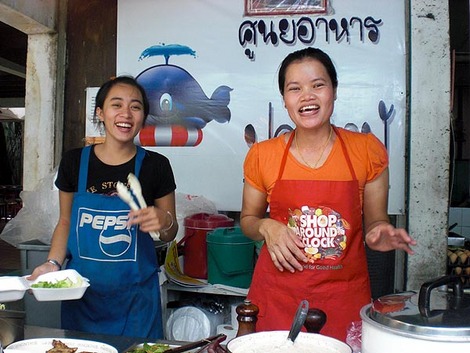
How to Cope with Culture Shock When Teaching in Thailand
For thousands of teachers who move to Thailand every year to teach English, all they can think about is how exciting it will be to live in another country and learn about a new culture, while hopefully helping to improve the lives of their students. In reality, what often happens after only a few weeks in Thailand is culture shock. It hits you fast, it hits you hard, and you suddenly find yourself thinking “What on earth am I doing here? I think I need to leave”.
Culture shock in Thailand hit me when I had only been living in Bangkok for two months. By that time, I had finished a 6-week TEFL course and was already looking for a teaching job.
I had a permanent apartment, I’d made some friends, and I had started to find my way around the city. Yet I woke up every morning thinking how much I hated Thailand and how desperate I was to leave. Needless to say, as I still live in Bangkok 12 years later, those feelings of culture shock and hatred of all-things Thai didn’t last long.
There were a few things, however, that I made sure I did to cope with culture shock when teaching in Thailand, so I could settle down and enjoy my new life. Those things may also help you if you too arrive to teach English in Thailand and suddenly start thinking “I hate it here”.

Learn about the culture – Much of the reason many people go through culture shock in Thailand is because of the strangeness of the culture and the people. Strangeness, of course, meaning many things are done differently than we do them in the west and, although incredibly friendly, Thais also behave far differently than westerners do in almost every situation. This can lead to a feeling of “Why are Thais such idiots?” when, in reality, they’re not.
When I started to experience culture shock in Thailand, instead of considering the people around me as only one step up from fools, I began to ask Thai friends why things were done a certain way and soon found out the reasons made perfect sense. After all, walking at a snail’s pace in Thailand as a Thai often does, rather than the fast pace a westerner would use, is perfectly understandable when you realize the country hovers around the 100 degree mark for much of the year, and Thais hate to sweat.
Twelve years later, when I look at westerners newly arrived in the city and pouring with sweat because they haven’t tried to slow down and adapt to Thai life, I often find myself thinking “Why are westerners such idiots?” Proof alone that culture shock in Thailand is now a thing of the past for me.
Learn the language – I started to feel less culture shock in Thailand as my ability to speak Thai improved. That’s because you learn so much about the country and the people when you can communicate in their language, and you also feel less of a ‘foreigner’. Take some Thai classes while you’re teaching in Thailand, and practice speaking with Thais wherever you can. Culture shock disappears quickly when you can understand what people are saying around you.
Establish a routine – Routines make us feel as if we belong to the place we are living in, so establishing one in Thailand soon after you arrive is a good way to avoid the worst culture shock.
Get up at the same time every day and make yourself a delicious breakfast before you leave for school. Find a coffee shop you like and visit every morning on your way to work. Get into a routine at school, and with your students and classes. Not only will that help you in teaching, but you’ll also start to feel as if it’s where you’re supposed to be.

Get to know people in your neighborhood – You start to feel as if your life is settled in Thailand when you know the people living near you. I made a point from the beginning of always talking to the people on my Bangkok street, even if it was only with the “Sawatdee kha” (Good day) that I knew.
You’ll be surprised how fast you feel like you fit in when you get cheery waves from the motorcycle taxi drivers as they zoom up the street, the fruit seller remembers your face and your order, and even the police officer directing the traffic smiles as you cross the street.
Stay busy – I found if I sat around in my apartment feeling sorry for myself, I became depressed, hated my life and Bangkok, and couldn’t wait to go home. So, every day, I made sure I was busy from the minute I got up until the time I went to bed. Not difficult at all in Bangkok, a city that never sleeps and where there are people around no matter what time of day or night you go out.
Of course, during the week when you’re teaching you’ll automatically find you are busy, but make sure you carry that over into your evening hours. Grab a beer after work with fellow teachers (western and Thai). Eat dinner out, as it’s cheap everywhere you go, and far more fun than sitting alone in your apartment.
On the weekends, visit local tourist attractions, and take your students or fellow teachers up on offers to go on day trips. You’ll see a lot of the country, and have an incredibly good time.
Make friends with Thais – The teachers who seem to suffer the most with culture shock in Thailand are those who don’t make friends with Thais. Instead, they sit in their groups of western teachers talking about the negatives of the country and putting down everything Thai.
Needless to say, the Thais don’t bother with them, and neither do any of the other westerners who are out enjoying their lives in the Land of Smiles.
Don’t do this. Instead, go out of your way to make friends with Thais. Overall, they are lovely people, and incredibly welcoming and friendly. Plus, you’ll find once you have made friends with a few Thais, Thailand itself will start looking wonderful as you are introduced to new people and places, and learn all about the secrets of living in Thailand that only a Thai would know.
After all, if you just want to hang out with other western teachers, eat western food and talk about western things, why on earth are you teaching in Thailand?
For more information about culture shock in Thailand and, yes, everybody experiences it, there’s an excellent book in the ‘Culture Shock: A Survival Guide’ series that will give you a heads up about things that will make you crazy before you even get here.
